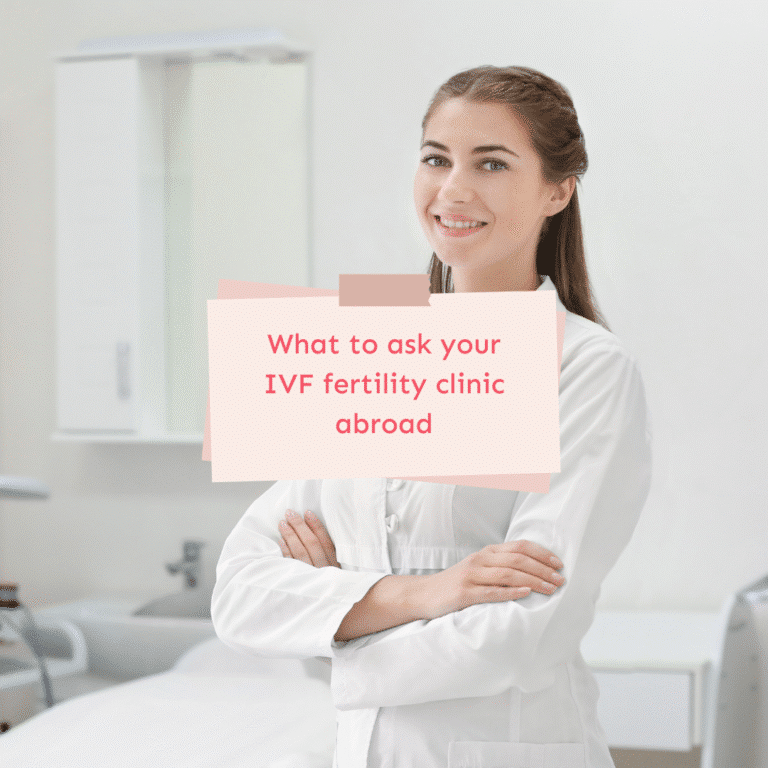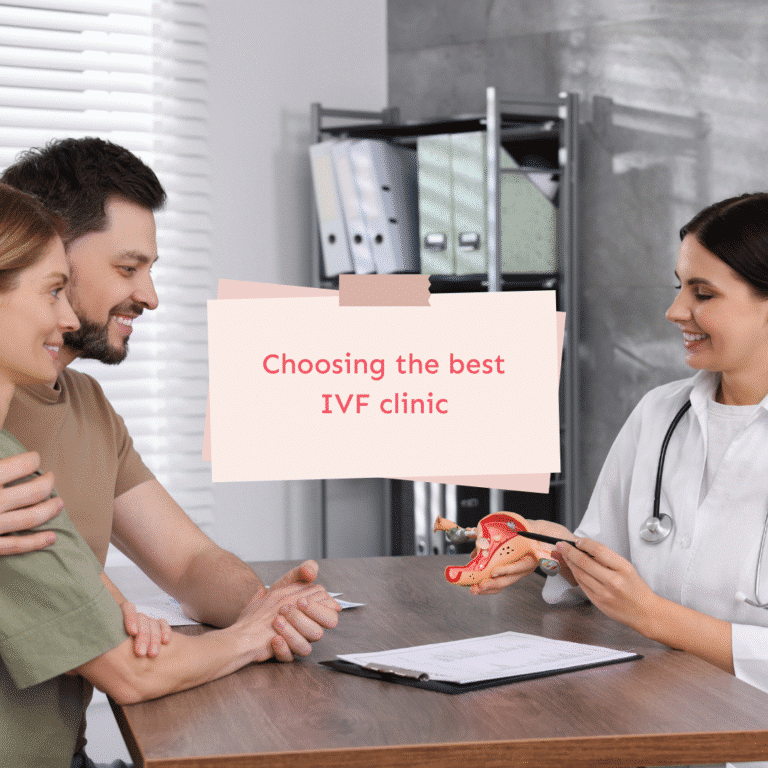Why a personal IVF consultation can save you from costly mistakes
Why international IVF treatment is so hard to navigate
When you’re considering in vitro fertilization abroad, it can feel like stepping into a maze. The websites look perfect. The photos shine. Success rates sound promising. But what’s behind those numbers? How do you know if a clinic really suits your specific fertility needs?
If you’re planning your first IVF cycle or already struggling with cause of infertility, chances are you’ve spent hours online. Comparing clinics. Reading reviews. Watching videos. And still – you’re left with additional questions than answers.
That’s exactly why a personal IVF consultation with a fertility specialist can make all the difference. Not because you can’t do it on your own – but because the information you need isn’t always online. Prices are rarely transparent. Technologies vary greatly. And clinics don’t talk about what’s missing.
In this blog, we’ll walk through what most women don’t know before starting their fertility journey abroad. You’ll discover what to expect during your first initial consultation, what important questions to ask, and how to avoid costly mistakes that delay your treatment plan.
By the end, you’ll understand how one conversation with someone who’s seen hundreds of clinics, spoken to embryologists, and visited international fertility conferences can give you the best chance to move forward with IVF – feeling confident, clear and supported.
Why online fertility research often leaves you overwhelmed
You’ve probably already typed “best IVF clinic” into a search engine more times than you’d like to admit. And still – the more you read, the more lost you feel. Every clinic claims high success rates. Every destination seems “ideal”. You find lists, reviews, ads – but none of them truly answer your personal questions.
That’s because online information often repeats the same generic claims. Real details about embryo quality, sperm selection methods or personalised treatment plans? Hard to find. Even a list of questions in forums or social media don’t reflect your situation – especially if you’re considering egg retrieval, embryo transfer or specific fertility options abroad.
And let’s be honest: it’s exhausting. You spend hours researching and still don’t know what to do next. That’s why many women describe this phase as the hardest part of their IVF journey to parenthood.
What makes your specific fertility situation so unique
No two fertility cases are the same. You may be planning your first IVF. Or maybe you’ve already gone through one or more unsuccessful cycles. Perhaps you’re over 40, using donor eggs, or your partner is dealing with male fertility issues.
Your uterus, your ovary response, your medical history – they all matter. But most general advice ignores these nuances. Some clinics might suit your specific fertility case, others not at all. And you won’t see that difference on a website.
That’s why a fertility consultation isn’t about giving you a list. It’s about understanding where you are right now, reviewing your previous fertility experiences (if any), and helping you prepare for IVF with realistic, medically informed options. Because when the plan fits you – not just “patients in general” – you finally know what to do next.
Why most fertility clinic lists, ads or doctor tips won’t help you
The truth about IVF success rates and hidden costs
It’s tempting to rely on clinic websites or glossy rankings to make your decision. Success rates look promising. Prices seem affordable. But once you dig deeper, you realise how much is missing. What exactly do those rates include? Are they based on all patients – or just the ideal cases?
Most fertility clinic websites show average results, not your chance of success. And very few explain how they handle embryo transfer, how experienced their lab team is, or what equipment they use. Clinics invest in very different technologies. Some use time-lapse incubators, others don’t. Some track sperm quality carefully, others rely on basic semen analysis. These details affect your outcome – but they’re rarely visible online.
As for costs: many prices leave out medications, diagnostic tests, or repeat egg retrievals. You might only find out later that your first IVF treatment will cost much more than expected.
Why clinics all look great – but you don’t see embryo lab standards or technology
Every clinic wants to appear modern. But behind the scenes, standards vary widely. During my visits, I’ve seen brand-new labs – and others using outdated equipment. Some embryologists regularly attend conferences and publish research. Others don’t. Some clinics already use AI-supported technologies like CHLOE to assess embryo quality – while others still rely solely on visual judgement by embryologists.
Even fertility specialists and doctors often don’t know these differences when recommending a clinic abroad. Why? Because they’ve never visited the lab. They don’t know how embryos are selected. And they haven’t seen the actual working conditions.
That’s why it’s so important to ask the right questions. Not just about the price or location – but about how a clinic works, trains its team, and makes medical decisions. This is what we cover in your consultation.
What no one tells you about choosing a fertility clinic abroad
From embryo transfer to sperm selection – what really matters
When comparing fertility clinics abroad, many women focus on surface-level things: location, language, price. But what truly affects your outcome lies much deeper – in the lab, the protocols, and the medical decisions that aren’t visible online.
Take embryo transfer, for example. Some clinics transfer on day three, others wait for blastocyst stage. That’s a big difference – and not every body responds the same way. Some clinics use advanced sperm selection tools, others still rely on basic semen analysis. And while everyone talks about fertilization rates, no one tells you how fertilization is actually achieved or which technique is used based on your fertility status.
These are not details you’ll find on a homepage. But they can affect whether you’ll need one cycle – or three.
What even most doctors don’t know about fertility clinic differences
Even gynaecologists and fertility doctors who refer patients abroad often don’t know how different the clinics really are. They see the brochures. They hear what the clinic says. But they’ve rarely been there. They don’t speak with the embryologists. And they don’t see how fast (or slow) a clinic adapts to new research or technology.
Some clinics already use AI-supported tools like CHLOE to help assess embryo quality. Others still decide based only on what the embryologist sees under the microscope. That difference in precision and consistency? It matters.
Recently, I spoke with a coordinator who had worked in several well-known clinics. She was shocked by the differences in lab standards, training, and even the way fertility medications were prescribed. It confirmed what I’ve been seeing for years: these clinics are not interchangeable. And knowing the difference can save you from months of trial and error.
What changes when you get an IVF consultation
From infertility stress to clarity – how a consultation helps
You might feel like you’ve already read everything. Maybe you’ve had a variety of fertility tests, a previous IVF cycle, or even a first IVF consultation with a fertility doctor. And still, you’re unsure what to do next.
That’s where a personal consultation can shift everything. Instead of more general advice, you finally speak with someone who understands the hidden differences between clinics, the challenges of fertility treatment abroad, and what other women in similar situations have faced.
We don’t discuss medical decisions – that’s your doctor’s role. But we talk through your experiences, your open questions, and where the confusion might come from. Often, it’s about seeing the bigger picture. Understanding what you can ask. Knowing which details to clarify before making a decision. That clarity alone can be a huge relief.
A calm and informed start to your IVF journey
Many women begin their IVF journey with a sense of doubt – not because they haven’t done enough research, but because they don’t know what actually matters. A personal consultation helps you find clarity, without trying to replace medical advice.
This isn’t about reviewing test results or choosing protocols. It’s about showing you what to pay attention to, which questions to ask the doctor, and how to recognise what might be missing from the clinic’s offer. You’ll get concrete ideas based on real experiences – not vague recommendations.
After the session, many women say: “Now I finally know what to ask, compare, and look out for.” And that changes everything. You don’t feel like you’re blindly guessing anymore. Instead of reading yet another article or forum post, you move forward with IVF calmly, clearly, and with much more confidence.
Why my personal fertility consultation is different
What I’ve learned from conferences, egg retrieval rooms and lab visits
Over the past decade, I’ve travelled to dozens of clinics across Europe and beyond. I’ve visited embryo labs, attended fertility conferences, and spoken with embryologists, coordinators and clinic founders. I’ve seen how clinics evolve – and how some stand still.
I don’t just rely on what clinics say about themselves. I look at how they train their staff, what technologies they invest in, and how open they are when I ask about sperm quality, fertilization methods, or their latest success rates. And I keep learning – by reading journals, following global trends, and asking the kind of questions that most websites never address.
This perspective is rare. Even doctors who refer patients abroad don’t usually know these details, because they haven’t been there. They work with what clinics share – not with what they observe directly. I do both.
Honest IVF insights instead of vague promises
In a consultation with me, you don’t get sugar-coated answers or promotional talk. You get honesty. If something is unclear or sounds too good to be true, I’ll tell you. If a clinic doesn’t explain how they handle embryo transfer or how they support patients with low ovarian response, we talk about it.
I don’t make promises. I don’t recommend one “perfect” clinic. But I’ll help you see the differences, avoid common traps, and feel more prepared for the next steps. Whether you’re considering your first IVF consultation, already preparing for treatment, or trying to avoid a repeat of a difficult experience – this is a space for you to ask and explore, without pressure.
Who this consultation is right for – and who it’s not
Is this your first consultation? Here’s how to tell if it fits
This consultation is for you if you’re feeling unsure – whether it’s your first fertility consultation or you’ve already had several. Maybe you’re just beginning to consider IVF abroad. Maybe you’re overwhelmed by the many clinics offering similar promises. Or maybe you’ve had a first IVF cycle and it didn’t go as expected.
You don’t need to have a full fertility diagnosis, a detailed treatment plan, or all your test results ready. What matters is that you’re asking: “Where do I start – and how can I avoid choosing the wrong clinic?” If that’s your situation, you’re in the right place.
This is not the right consultation if you’re expecting medical advice or a ready-made decision. I don’t replace your fertility doctor. And I don’t push you in any direction. What I offer is independent insight, based on experience, transparency, and conversations with thousands of women like you.
What to expect before, during and after your fertility consultation
Once you book, you’ll receive a Zoom invitation along with a short message where you can share your starting point. Whether you are undergoing IVF for the first time, or you have a complex fertility history, or just have a general interest in going abroad – this helps me prepare for our session and focus on what matters most to you.
During the call, we take time to talk through your questions and goals. It’s a safe and confidential space – you’re not being rushed, and nothing is off limits. I’ll share what I’ve seen across hundreds of clinics and thousands of consultations. And if you want, I can give you 2–3 concrete tips on clinics or treatment options that could suit your situation.
After the consultation, you’ll receive a follow-up email from me. It includes a short summary of what we discussed, plus helpful links and info related to the questions you asked. Many women tell me this message becomes their starting point – a way to move forward without feeling overwhelmed.
You can always reach out again if more questions come up. But in most cases, women don’t need a second consultation. They leave the call with a clear direction, feel emotionally grounded, and move on with confidence.
And many months later, I often get a quiet message “I’m pregnant Thank you.” – short, heartfelt updates that mean the world. Because by then, they’ve found their path – and that was always the goal.
“You don’t need more information. You need someone who truly understands your needs – and helps you see the next steps clearly, saving you frustration, time and money, so that your dream can finally come true.”
Nathalie Wiederkehr
What you walk away with – and what you avoid
Save time, money and avoid unnecessary ovarian stimulation
A personal consultation doesn’t just give you orientation – it saves you from wasting energy. Most women I speak to are simply relieved. Because once they know where to go and what to ask, they stop second-guessing themselves.
By investing time in every step of the way, you avoid treatment paths that may not be right for you. In some cases, I’ll honestly tell you that an IVF might not make sense anymore – for example, if the chance of success is below 1%. Some clinics still offer it, even then. But a donor egg treatment could bring success rates of up to 80%. Knowing that early can save you a lot of money, time and disappointment.
You also avoid unnecessary steps like repeated ovarian stimulation or a poorly explained treatment plan. Instead of jumping into the next IVF cycle, you pause, reflect – and move forward with more clarity.
The right questions to ask before embryo fertilization even starts
One of the most valuable parts of the consultation is understanding which questions truly matter. That includes topics like how the clinic handles fertilization, what sperm selection techniques they use, how they assess embryos, and how they decide on embryo transfer timing.
But also the questions that most women never think to ask – or don’t know they can ask:
Are open donations available? What IVF process controls are in place to avoid mix-ups of donor sperm or eggs? How many chromosomes are tested during PGT-A – and which technique is used? Some clinics check just 5 chromosomes. Others check all. This difference isn’t just about cost – it affects your chance of success.
It’s about knowing which questions to ask. And more importantly: it’s about knowing which questions to ask in relation to your personal situation. That’s what makes the conversation so different from what you find in forums, videos or first clinic calls.
Why investing in your IVF consultation makes sense
A smart step forward with IVF – before wasting energy or money
There’s so much pressure to decide quickly. But what if taking one quiet step back helps you avoid five wrong steps forward?
A personal consultation gives you clarity before emotions, ads or time constraints push you into something you might later regret. Instead of booking a clinic call you’re unsure about, or starting treatment without knowing what’s actually involved, you take the time to understand what matters for you.
Many women say this conversation changed their perspective – not because they were told what to do, but because they finally understood their options. That’s not something you can find in a checklist or comparison site. It only comes from someone who knows how clinics work – and who listens carefully to where you are now.
When one conversation can prevent months of frustration
Most women who come to me are simply relieved to talk to someone who knows what they’re going through. They’re glad to benefit from my experience, and they feel more confident afterwards – because deep down, they’re all afraid of choosing the wrong clinic.
There’s so much talk in forums. Everyone has an opinion. But no one shares the full picture. And online reviews – even Google ratings – have become hard to trust. They reflect emotions, not facts. And they rarely show what really happens behind the scenes.
That’s why this conversation matters. It’s not about choosing for you. It’s about helping you feel informed, supported, and finally safe to make the right decision – on your terms.
Before you book – here’s what really matters
If you’re looking for names to get started, you’re not alone – that’s exactly what most women want from this conversation. And yes, I’m happy to give you some tips based on your personal situation.
That might include ideas for suitable treatment options or clinics that match your needs – whether you’re navigating a complex case, considering egg donation, planning IVF / ICSI (intracytoplasmic sperm injection) with gender selection, looking for open donation, or exploring motherhood as a single woman, in a lesbian couple, or over the age of 50.
The suggestions I give come from personal visits, conversations with clinic staff, and years of experience observing how differently clinics operate – in practice, not just on paper. If something seems unclear, outdated or not transparent, I’ll tell you that, too.
These aren’t final answers – but they help you move forward with clarity and confidence.
Ready for your next steps? Here’s how to begin
Download the IVF destination guide to get oriented
If you’re just starting to explore fertility treatment abroad, the best first step is to understand what’s possible – and where. Our free guide gives you an overview of IVF options in different countries, including treatments like egg donation, gender selection, and genetic testing.
It also includes a real example of a clinic in Northern Cyprus, with transparent pricing and typical success rates. Not to recommend, but to help you understand what’s realistic. This gives you a clear idea of what to expect – and how the process might look in your case.
Book your fertility consultation and move forward with IVF feeling informed
If you’re ready for personal guidance and want to stop guessing, you can book your consultation directly online. You’ll receive a Zoom link and a short message where you can share your situation – so I can prepare and make sure the session is truly helpful for you.
This is your space. No pressure. Just real support from someone who understands what’s out there – and how different the path can be depending on your needs.
You don’t have to figure it all out alone. And you’re not the only one who feels unsure at the beginning.
But once you know what matters, you’ll move forward with much more peace of mind.
Whether it’s your first appointment or you’ve been through several cycles already, a consultation with one person who truly understands the reality behind assisted reproductive technology can make all the difference – especially when you’re struggling with infertility, afraid to ask certain things, or unsure what to ask about the clinic’s experience. I’m here to support you every step of the way, so you feel ready to make an appointment, ask the important (and often unasked) questions – and take the next step toward getting pregnant, a successful pregnancy, and ultimately, a healthy pregnancy.
















